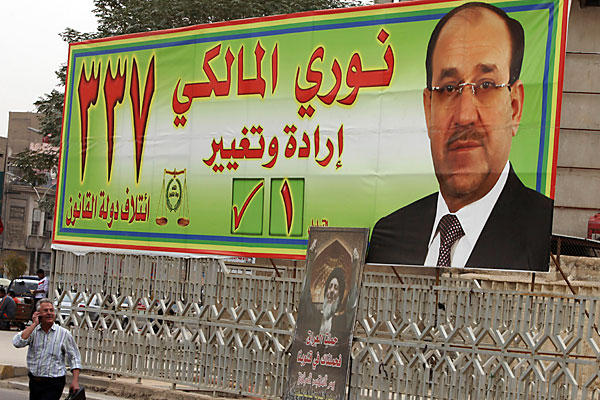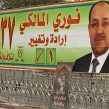
Security Implications of Shi’a Politics in Post-Election Iraq
Publication: Terrorism Monitor Volume: 8 Issue: 11
By:

Although the final count will not be available until the end of March, the preliminary results from Iraq’s parliamentary election show a strong victory for the State of Law list (SLA), led by the current Prime Minister Nuri al-Maliki and the Iraqiyya Coalition, led by Iyad Allawi (Tabnak, March 8; al-Jazeera, March 14; IRNA, March 14; al-Sumaria TV, March 14). Unlike the 2005 elections, the latest results appear to indicate a seismic shift away from sectarianism and a decline of the Shi’a Iraqi National Alliance (INA), a situation most favorable to the United States (Fars News, March 7). With Kurds losing to Allawi in Kirkuk and the INA’s apparent defeat in many southern provinces, Iraq appears to have overcome its ethnic and sectarian party politics (al-Jazeera, March 15).
In reality Iraqi politics still retain their sectarian composition, with Shi’a-dominated parties playing a major role in creating several security problems in the country. Although it describes itself as non-sectarian, the SLA coalition remains for the most part a Shi’a political alliance. This sectarianism is reflected mainly in al-Maliki’s support for anti-Sunni policies, including the disqualification of a number of Sunni politicians like Salah al-Mutlak through the de-Ba’athification program led by Ahmad Chalabi, who has close ties with Iran (Voice of Iraq, January 8; Asharq al-Awsat, January 10). In many ways, al-Maliki’s popularity has been sustained by his efforts to bring security to the country, but signs of increasing sectarianism in his political coalition and close ties with factions of the INA led by Amar Hakim’s pro-Iranian Islamic Supreme Council in Iraq (ISCI) could inspire a new wave of sectarian politics in the post-election period.
Moreover, allegations of fraud by Maliki’s rival factions not only reflect deep tension within the Shi’a faction, but also signal a brewing problem over post-election governance and stability. The INA, led by Hakim, appears to support the charge that Allawi’s promotion by pro-Saudi news media (including al-Arabiya) and the apparent production of seven million surplus ballots reeks of pre-planned fraudulent activity (IRNA, January 11; al-Alam TV, March 5; Fars News; March 7; Kayhan, March 8). If such allegations resonate between the major factions (especially the Shi’a factions) during the first weeks of government formation, a major crisis of legitimacy could ensue, jeopardizing the political process as a result. Charges of fraud could also create an atmosphere of distrust, further dividing Iraq’s ethnic and sectarian communities.
In terms of governance, Baghdad remains notorious for its factional and personal politics and any process of government formation will be a messy one (Vatan Emrooz, March 9). A possible SLA and INA government coalition may seem natural to Tehran, which seeks to increase sectarian politics in its neighbor, but it could result in a weak government with growing factional conflicts over issues such as state centralization and inter-sectarian relations (especially between Sunni and Shi’a political elites). Since tensions between al-Maliki and the Dawa-Sadrists remain high, a SLA-INA coalition could lead to ineffective governance in the critical first year of the newly-formed government, when security should be of the utmost concern for the central state (IRNA, January 27).
If an INA and SLA alliance develops, Allawi’s marginalization from politics could encourage the Saudis to increase their support for the Sunnis (as they did between 2005 and 2007), a move that could result in Iran spreading its influence in Baghdad to curtail Saudi influence. So far, Tehran has hailed al-Maliki’s electoral gains as a “Shi’a victory” (Kayhan, March 10). However, Tehran is also aware that it has lost much of its influence with the rise of al-Maliki after the Basra offensive in March 2008 and the Iranian occupation of the Fakkah oil field. Despite the efforts of Iran’s Speaker of the Parliament, Ali Larijani, to rally the Shi’a in a united political front during his last trip to Iraq, Shi’a factions remain divided over many issues, including the extent to which Iran should play any role in Iraq’s internal politics. [1]
Finally, there is the issue of American troop withdrawal, scheduled for the end of 2011. If security in Iraq deteriorates, U.S. troops have the option to extend their stay (Fars News, March 7). With the strong possibility of a continuous U.S. presence in Iraq beyond 2011, key anti-occupation factions like the Shi’a Sadrists, the Sunni Ba’athists or the Sunni Islamists could reemerge to challenge the political establishment for legitimacy and power. If pre-election violence in Baghdad, Fallujah, Najaf and Mosul is any indicator, Iraq will continue to undergo increasing violence in the next few months, when the coalition formation government remains at its weakest (Press TV, March 5; al-Jazeera, March 6; IRNA, March 7). In the post-election period, Baghdad must quickly engage in the formation of a government that is inclusive and strong to ensure stability for Iraq’s fledging democracy.
Notes:
1. Interview with an Iranian Iraq expert, Tehran, Iran, March 6, 2010 (name withheld by request).





